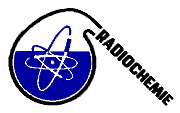Speaker
Mr
Toni Petrovic
(Student of Jožef Stefan International Postgraduate School, Ljubljana, Slovenia)
Description
The European legislation (Council Directive 98/83/ec) requests the member sates to control the radioactive contamination of drinking water. As a part of these measurements γ-ray spectrometric measurements are performed. Samples of 50 L of water are evaporated and the residue after evaporation is measured. Typically, 20 g – 40 g of residue is obtained.
Since by γ-ray spectrometry activity concentrations of radioactive isotopes emitting γ-rays can be determined also the concentration of natural 40K in the samples is measured. The measurements of activity concentration of 40K are relatively easy since it radiates at an energy, where no interference with other γ-ray emitters occurs.
Drinking water in Slovenia is gained mainly from the ground water. Therefore the concentration of potassium in drinking water reflects the properties of the rock of the aquifer as well as the geochemical conditions there. The activity concentration of 40K in drinking water may bear information on the circumstances in the aquifer from where drinking water is extracted.
In the contribution the correlation between the activity concentration of 40K in drinking water and the potassium concentration in the soil will be presented. The correlation will be discussed in terms of the geological properties of the aquifers and the level of the water table.
Author
Mr
Toni Petrovic
(Student of Jožef Stefan International Postgraduate School, Ljubljana, Slovenia)
Co-authors
Dr
Benjamin Zorko
(J. Stefan Institute, Ljubljana, Slovenia)
Dr
Marijan Necemer
(J. Stefan Institute, Ljubljana, Slovenia)
Dr
Matej Lipoglavšek
(J. Stefan Institute, Ljubljana, Slovenia)
Dr
Matjaž Korun
(J. Stefan Institute, Ljubljana, Slovenia)

